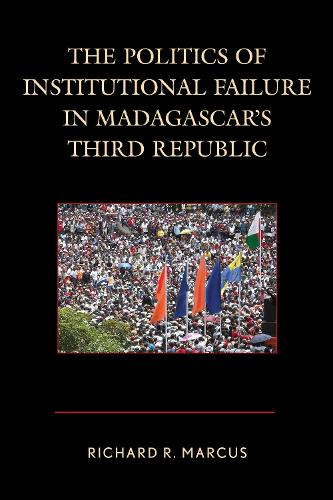
The Politics of Institutional Failure in Madagascar's Third Republic
(Hardback)
Publishing Details
The Politics of Institutional Failure in Madagascar's Third Republic
By (Author) Richard R. Marcus
Bloomsbury Publishing PLC
Lexington Books
10th February 2016
United States
Classifications
Tertiary Education
Non Fiction
Political structure and processes
969.1055
Physical Properties
Hardback
254
Width 158mm, Height 240mm, Spine 25mm
581g
Description
Madagascars constitution of August 19, 1992 brought hope to a population exhausted by economic failures associated with a failed experiment in scientific socialism and years of mismanagement. The repetition of transparent elections and the promulgation of good governance in the years that followed appeared to serve as an indicator of institutional strengthening and, by extension, progress. Unfortunately, a broader institutional analysis points toward a series of shocks to the political system by way of legal, but highly detrimental, juridical and constitutional shifts to the system. These shocks were meant to serve particularized political networks with long clientalistic roots and were made possible by the narrow vision of institutionalism that did not take careful stock of those networks or the leaders at the top of them. Little effort was made to look beyond a legislature brought in by careful elections but producing legislation serving individuals, the ways in which inchoate political parties distort institutional outcomes and the potential for institutionalization, the weakness of civil society to offer opportunities for popular engagement, or the use of donor-funded decentralization programs to build ministries that served as powerful and rapid proxies for leadership centralization. By the time the celebrated president, Marc Ravalomanana, was overthrown in March 2009 it became clear that there were few opportunities to seed political opposition and such limited space between individual leaders and primary institutions of public management that critical state functions immediately began to unravel. In this book the author considers the institutions of the Third Republic, how they formed, and why they looked like models for democratic change before turning to consider how the institutions themselves have been manipulated in plain sight by leaders looking to champion their own networks. He concludes that the rise of the Fourth Republic in 2010 did little to address these underlying concerns and argues that a new agenda is in order to consider not just the way in which institutions form, but the way in which networks of power, and leaders at the top of those networks, grow and change malleable institutions in young democracies with few avenues of accountability.
Reviews
Richard Marcus brings together two decades of research and writing on Madagascar in a volume that looks beneath institutions to grasp a dynamic and complex reality.The macroscopic perspective and analysis of change over time is a welcome antidote to the short-termism that dominates much of the literature on African politics.Marcuss commitment to Madagascars future and the wellbeing of its population shines through. -- Catherine Boone, London School of Economics
Richard Marcus has broken new ground in the institutional approach of the political development of Madagascar. As a result of his fieldwork, he is able to describe the political development of the countrys transition from the beginning of the Third Republic into the Fourth Republic without undermining the political, social, economic, and cultural contexts of Madagascar in a truly poignant manner. If you want to understand the processes and the roles of multiple actors in crafting changes in a troubled democratic system, this is the book to read. -- Joel Raveloharimisy, Andrews University
Author Bio
Richard R. Marcus is professor and director of the Global Studies Institute and the International Studies Program at California State University, Long Beach.
